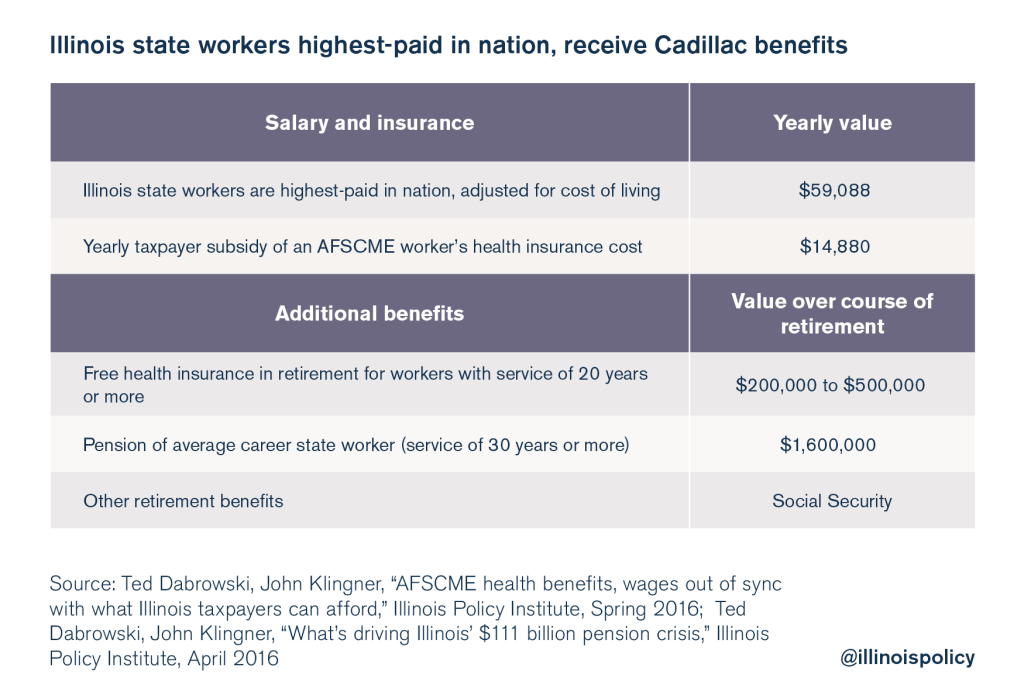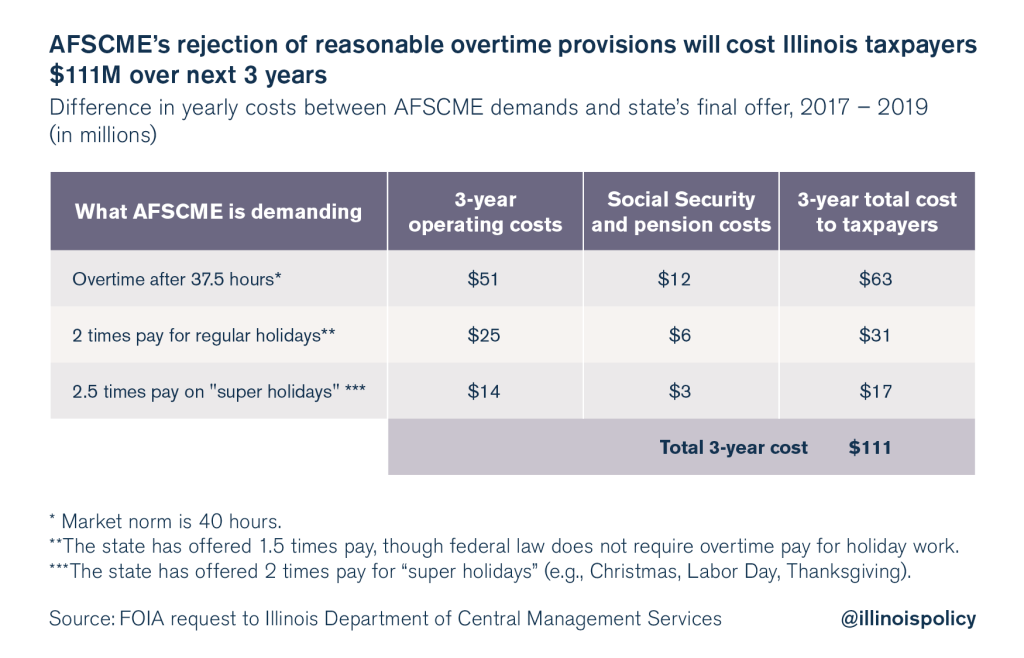Labor board declares impasse in contract negotiations between AFSCME and the state
Negotiations between Illinois and AFSCME – the state’s largest government-worker union – languished for months. While AFSCME demanded contract benefits that would cost the state $3 billion in additional salary and benefit increases, Gov. Bruce Rauner offered a contract that treats state workers fairly and avoids further burdening taxpayers. On Nov. 15, the Illinois Labor Relations Board issued a decision that prevents AFSCME from obstructing progress on an agreement.
In a 5-0 decision, the Illinois Labor Relations Board determined on Nov. 15 that the state and the American Federation of State, County and Municipal employees are at an impasse in negotiations for a new contract for state employees.
In light of the state’s fiscal crisis, Gov. Bruce Rauner has sought contract provisions that would benefit state workers and state taxpayers alike, but AFSCME has repeatedly rejected the state’s proposals. For example, the state proposed a temporary four-year salary freeze, but also proposed bonuses for state workers based on hard work and performance. AFSCME also rejected the state’s proposal that overtime start at the market norm of 40 hours, instead demanding that overtime pay apply after just 37.5 hours in a week.
The board’s decision means the governor will be able to implement his last and best offer to AFSCME. AFSCME, in turn, can strike. AFSCME can also appeal the board’s decision to a state appellate court.
AFSCME already receives top-notch pay and benefits
Illinois state workers already are the highest-paid state workers in the nation when adjusted for cost of living. When the most recent AFSCME contract expired in 2015, the median AFSCME salary was $63,660 – compared with just under $32,000 for an Illinois worker in the private sector. In fact, according to the U.S. Census Bureau, the median income for an individual AFSCME worker is higher than the median income for an entire Illinois household in the private sector (just under $58,000 in 2014).
But on top of that, AFSCME workers get platinum-level health insurance – a level of coverage not even available to Illinoisans on the state’s insurance exchange, let alone at the rock-bottom price state employees pay. Taxpayers subsidize a whopping 77 percent of the average AFSCME worker’s health care, which costs taxpayers $14,880 a year per worker.
Most AFSCME employees also receive free health insurance at retirement, simply by working 20 or more years. This benefit alone costs taxpayers $200,000 to $500,000 per employee.
In addition, state retirees on average receive $1.6 million in pension benefits, in addition to Social Security.

But that isn’t enough for AFSCME leadership, which is making contract demands the Rauner administration estimated would cost the state an additional $3 billion in pay and benefits for state workers. Those demands include wage increases of 11.5 to 29 percent by 2019, continued platinum-level health insurance at little cost to workers, and a workweek with overtime for workers after just 37.5 hours. In a letter to state employees, Rauner explained that the wage-increase demands alone would cost the state nearly $1 billion.
Rauner’s proposed AFSCME contract
Rauner, on the other hand, is trying to bring union costs in line with what Illinoisans can afford, while avoiding widespread state worker layoffs.
To ease the financial burden on taxpayers, Rauner’s proposal to the union includes a temporary four-year wage freeze on AFSCME salaries. At least 19 other unions have already ratified contracts with the state that include provisions similar to those offered to AFSCME. Both the Teamsters and the Illinois Federation of Teachers have agreed to a temporary four-year wage freeze.
And instead of continuing to provide platinum-level health insurance at bronze-level prices, the governor is asking AFSCME workers to pay 40 percent of their health care premiums – up from the 23 percent they pay now. This means state taxpayers will continue subsidizing 60 percent of an AFSCME employee’s health care, at $11,600 per worker annually – still a significant amount by any standard.
The governor also has proposed overtime provisions that more closely reflect what exists in the private sector. Currently, many state workers earn overtime after working just 37.5 hours in a workweek. Rauner’s proposal would require 40-hour workweeks for state workers before overtime kicks in. The difference between a 37.5-hour workweek and a 40-hour workweek would save the state $63 million dollars over the term of the contract.
The proposal also adjusts overtime pay for holidays. Currently, state employees earn double time if they work on any one of the following holidays or their observed days: New Year’s Day, Martin Luther King Jr. Day, Lincoln’s Birthday, Presidents Day, Memorial Day, Independence Day, Columbus Day, Veterans Day, the Friday after Thanksgiving and Election Day.
The expired contract also included three “super holidays”: Labor Day, Thanksgiving Day and Christmas Day. Employees working on super holidays earn double-and-one-half times their normal rate of pay.
The governor’s proposal would modify holiday overtime, providing that AFSCME employees would receive overtime pay at the rate of time and one-half (rather than double time) for regular holidays, and double time for super holidays. This adjustment to holiday pay would save taxpayers $48 million over the life of the contract.

The governor’s proposal also includes many provisions that would benefit AFSCME workers. For example, Rauner’s offer maintains workers’ current salary levels.
In addition, the governor has proposed over $200 million in additional compensation in the form of bonuses when employees meet simple, objective standards – such as not having unexcused absences. Also known as merit pay, this performance-based incentive would reward good employees with bonuses above and beyond normal salary.
And many other lavish perks – such as lax disciplinary rules allowing workers up to 10 unauthorized absences without repercussions – would continue under Rauner’s last offer.
While the board’s decision brings the parties one step closer to the implementation of a contract for state workers, things are still far from over. With AFSCME expected to appeal the decision, it will be early 2017 – at the earliest – before resolution of the stalemate between AFSCME and the state.
